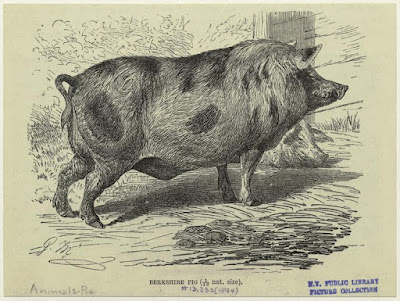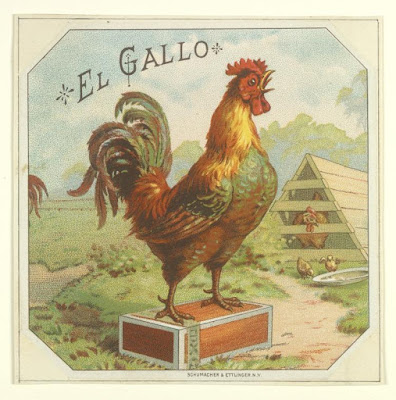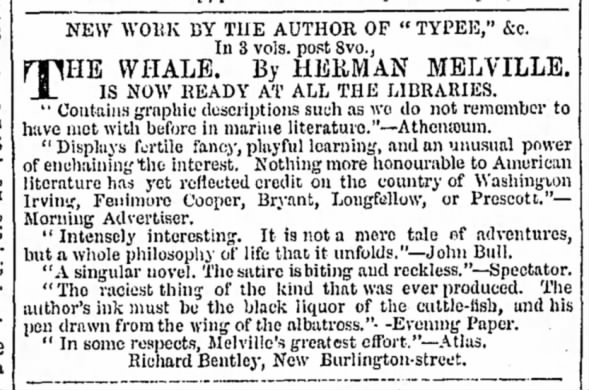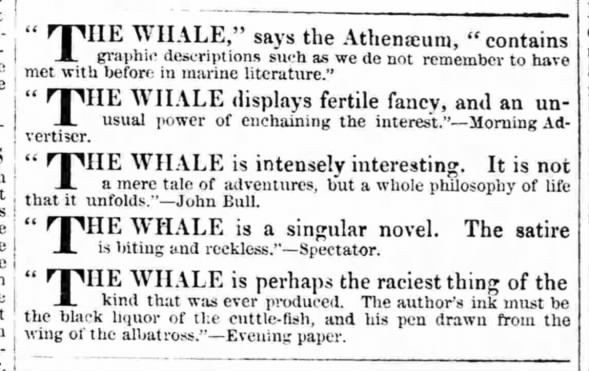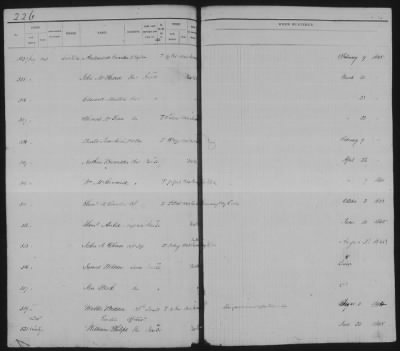The substantial and distinctly, aggressively personal ("We long to give you one good shake....") attack on Melville and
Melville's Pierre in the New York
Herald is reprinted in
Herman Melville: The Contemporary Reviews, edited by Brian Higgins and Hershel Parker (Cambridge University Press, 1995), pages 437-439.
Earlier collections with the September 18, 1852
Herald review are
Melville: The Critical Heritage ed.Watson Gailey Branch (London: Routledge & Kegan Paul, 1974); and
Critical Essays on Herman Melville's Pierre; or, The Ambiguities; ed. Brian Higgins and Hershel Parker (G. K. Hall, 1983).
These twentieth-century reprintings of the
Herald review all read "dangerous poet" in the following passage:
For a murderer in cold blood — a wretch who cooly loads his arms, rams the charge home, and sallies forth with the set purpose of taking the life of his rival — we have no thrill of sympathy, no bowels of compassion. Let him hang like a dog! A harmless madman in the first chapter, he is a dangerous poet in the last. Let him hang! --as reprinted in Herman Melville: The Contemporary Reviews, page 438
But images of the 1852
Herald review provided by
The Library of Congress-Chronicling America and
GenealogyBank supply the right word, "pest" not "poet":
 |
| New York Herald - September 18, 1852 |
For a murderer in cold blood — a wretch who coolly loads his arms, rams
the charge home, and sallies forth with the set purpose of taking the
life of his rival — we have no thrill of sympathy, no bowels of
compassion. Let him hang like a dog! A harmless madman in the first
chapter, he is a dangerous pest in the last. Let him hang!
The New York herald. (New York [N.Y.]), 18 Sept. 1852. Chronicling America: Historic American Newspapers. Lib. of Congress. <http://chroniclingamerica.loc.gov/lccn/sn83030313/1852-09-18/ed-1/seq-6/>
 |
Review of Herman Melville's Pierre
New York Herald - September 18, 1852 via Library of Congress |
The unsigned review of Melville's
Pierre on September 18, 1852 in the New York
Herald can also be found in the archives of
Historical Newspapers at GenealogyBank (only just added there, within the past month).
In context, "pest" makes better sense than "poet," which might derive from a blurry microfilm copy or perhaps (along with "cooly"?) a different edition of the newspaper. Pierre supposedly wrote light occasional verse, but the added chapters on authorship describe him in the city as a novelist. His actions are more troubling to the critic than his writings. The
Herald critic admits to liking Melville's rebellious hero at first, but refuses to sympathize with the cold-blooded killer he becomes. As a dangerous criminal, a murderer, this Pierre deserves hanging. Emphatically: "Let him hang like a dog!" By also calling Pierre "a dangerous pest," the critic possibly means to associate Melville's doomed enthusiast with insect or animal "pests" that are dispassionately exterminated as threats to public health. In this view, Melville's Pierre would deserve no more sympathy than rats and roaches. More generally, the sense of
pest here fits the secondary definition (after "Plague") in Webster's
Dictionary of the English Language: "Any thing very noxious, mischievous or destructive."
Here's my transcription of the full review:
Literary Notices.
PIERRE, OR THE AMBIGUITIES. — By Herman Melville. New York: Harper Brothers, 1852. — Ambiguities, indeed! One long brain-muddling, soul-bewildering ambiguity (to borrow Mr. Melville's style), like Melchisedeck, without beginning or end—a labyrinth without a clue—an Irish bog without so much as a Jack-o'-th'-lantern to guide the wanderer's footsteps—the dream of a distempered stomach, disordered by a hasty supper on half-cooked pork chops. Verily, books spring to life, now a days, by a strange Caesarian process. Our ancestors, simple folks, used to fancy it incumbent on an author to nurse the germ in his fecundated brain till the foetus assumed a definite shape, and could be marshalled into existence, safe from the brand of monstrosity. Modern writers miscarry 'ere the embryo hath shapen limb or nerve, or blood, and midwives and doctors in droves pledge their willing faith that it will live. Potent elixirs and cordials elicit some reluctant spark of animation; but reaction soon follows, and 'mid the feigned astonishment of foster-mothers and wet-nurses, the emasculated bantling expires a miserable death.
What can be more conclusive evidence of immature conception than the planting on the social stage of this nineteenth century, of a man like Pierre—brimful of noble passions—silly weaknesses—lordly power of mind and warmth of heart—the petted child of a tender mother, who, yielding to her son's craving after sisterly love, calls him "brother"—thrusting him into contact with a timid, fragile girl, who turns out to be an illegitimate daughter of his father's, and firing him with such a chivalrous devotion for this new found sister, par la main gauche, that he resigns, without a pang, home, mother, betrothed, rank, and even the necessaries of life, to roam the world, knight-errant like, in her company; reversing, with less show of reason, Abraham's white lie, and proclaiming publicly that the daughter of his father is his wife? Where did Mr. Melville find an original for the portrait of Isabel? Where for Mrs Glendinning? Alas! Those pork chops! Sore must have been the grapple between the monster indigestion and the poor suffering epigastrium. Frantic the struggle between the fiend nightmare and our unfortunate friend the author.
We do not object to a canvas well laid with weird horrors, fantastic sprites gushing from out some misty cloud, and playful imps, dancing and chattering in the foreground, to the ruin of the composition of the picture, and to the speechless agony of the severe classic. But, good Mr. Melville, your dream has overstepped the bounds of our impressibility. We long to give you one good shake, to have you rub your eyes, and favor us with the common sense word of the enigma. Is Pierre really a candidate for the distinguished honor of a latticed chamber at the Brattleborough asylum? Would a mild infusion of hellebore, and a judicious course of treatment in some sunny vale, calm his phrenzy, and cool his calcined brain? Or are his erratic habits—his wondrous épanchement for a full-blown sister—his reckless disregard of filial duty, plighted love, and public esteem—mere forms of eccentricity, outward symptoms of the genius latent within? We confess that we should like to be correctly informed on these points. We own to a sneaking partiality for Pierre, rough and unnatural as he is, and share his fiery rebellion against the yoke of conventional proprieties, and the world's cold rules of esteem. Weep we, too, with gentle Isabel; poor bud, blighted by a hereditary canker. And, need we blush to avow that our pulse beat faster than our physician in ordinary would have sanctioned, when the heartless Stanly disclaimed his poverty-stricken cousin, and strove to wrest his reluctant bride from the arms of her chosen lover? But that shot—was it manly? was it honorable? was it fair? to requite a hasty blow, well warranted, du reste—for who would not strike to the earth one who passed for the seducer of his mistress?—with a pistol ball, fired from an arm's length on a defenceless man? This, Mr. Melville, is murder. For a murderer in cold blood—a wretch who coolly loads his arms, rams the charge home, and sallies forth with the set purpose of taking the life of his rival—we have no thrill of sympathy, no bowels of compassion. Let him hang like a dog! A harmless madman in the first chapter, he is a dangerous pest in the last. Let him hang! And those ill starred girls! Ill became it their pure maidenhood to drench the fatal phial, and drown the spark of heavenly virtue and earthly sense in one corroding draught of poisonous passion. Sadly, too sadly—but, as we said, we cannot wholly eradicate every trace of compassion for the erring impulse of confiding girlhood—do we see Lucy relax her hold of the flask, and reeling forward, fall heavily across the pro[s]trate form of her lover. These three—the murderer, the child of fractious whim and ungovernable passion, the self-denying woman, to whom infamy is pleasant, so it be the price of her lover's society—the pariah, clinging, cerement-like, to the only hand that has ever clasped hers in friendly grasp—stiffening horridly in the rack of death, and clenching, in the last throe, the hem of each other's garment—oh! 'tis a mournful, a sickening picture!
Why did Mr. Melville desert "that bright little isle of his own," in the blue waters of the Pacific? Is Polynesia used up? Has the vulgar herd of authors penetrated the fastnesses of those primitive tribes, whose taboo has become naturalized among us, and whose aquatic nymphs have fired the imagination of many a future Bouganville or Cook? Is there not a solitary whale left, whose cetaceous biography might have added another stone to the monumental fame of the author of Moby-Dick? If our senses do not deceive us, Mr. Melville will rue his desertion of the forecastle and the virgin forest, for the drawing room and the modest boarding-house chamber. The former was the scene of victories of which no young author need be ashamed; the latter, we fear, has some defeats to witness. Social life is not, perhaps, more difficult to paint than pleasant excursions into Mahomet's paradise; but it requires a different order of talent. Mere analytical description of sentiment, mere wordy anatomy of the heart is not enough for a novel to-day. Modern readers wish to exercise some little judgment of their own; deeds they will have, not characters painted in cold colors, to a hairbreadth or a shade. We are past the age when an artist superscribed his chef d'oeuvre with the judicious explanation, "this is a horse." Mr. Melville longs for the good old times when the chorus filled the gaps between the acts with a well-timed commentary on the past, and a shrewd guess at the future.
But we have a heavier charge than this to advance. Mr. Herman Melville, the author of "Typee" and "Omoo," we know; but who is Mr. Herman Melville, the copyist of Carlyle? Most men begin by treading in the wake of a known author, and timidly seeking for shelter under the cover of his costume. Mr. Melville ventured his first flight on his own unaided pinions, and now that their strength has been fully tested, voluntarily descends to the nursery, and catches at leading strings. No book was ever such a compendium of Carlyle's faults, with so few of his redeeming qualities, as this Pierre. We have the same German English—the same transcendental flights of fancy—the same abrupt starts—the same incoherent ravings, and unearthly visions. The depth of thought—the unerring accuracy of eye—the inflexible honesty of purpose, are wanting; at least, nothing outwardly reveals their presence. Like many other people, Mr. Melville seems to have attributed a large share of Carlyle's popularity to his bad English; whereas, in point of fact, his defects of form have always proved a drawback to his success, and nothing short of his matchless excellence of matter, would have introduced him into literary society. A much higher rank would have been held to-day by the author of "Sartor Resartus," had he clad his striking and brilliant ideas in a less barbarous garb. The fault was original and "catching." Herds of pretenders to literary fame have ranged themselves under the banner of the Edinburgh reviewer, and, fancying they were establishing a Carlyle-ist school, have borrowed their master's hump, without stealing a single ray from the flashing of his eye, or a single tone from the harmony of his tongue. Sorry, indeed, are we to class Mr. Melville among these. Could he but sound the depths of his own soul, he would discover pearls of matchless price, that 'twere a sin and a shame to set in pinchbeck finery. Let him but study the classic writers of his own language—dissect their system—brood over their plain, honest, Saxon style—not more French than German—the search would soon convince him that he might still be attractive, though clad in his homely mother tongue. Soyons de notre pays, says the poet-philosopher of Passy [Pierre-Jean de Béranger], it will satisfy our wants, without borrowing tinsel imagery of a Lamartine, or the obscure mysticism of a Goethe or a Kant.
Yet a single admonition. Nature, Mr. Melville, is the proper model of every true artist. Fancy must be kept within proper bounds, and the eye must never be suffered to wander from the reality we are striving to paint. No poetical license can justify such departures from the style of ordinary dialogue as abound in this book. The Tireis-and-Phillis tone of conversation is long since dead and buried; trouble not its ashes. Passion can excuse incoherency, but not fine drawn mannerism, or gaudy concetti. For instance, what can be in worse taste than the following reply of Isabel, when Pierre entreats her not to demur to Lucy's living with them?
"Thy hand is the castor's ladle, Pierre, which holds me entirely fluid. Into thy forms and slightest moods of thought thou pourest me; and I there solidify to that form, and take it on, and thenceforth wear it, 'till once more thou mouldest me anew. If what thou tellest me be thy thought, how can I help its being mine?"
How false this coloring! How far from the sweet simplicity with which Sterne or Tennyson would have robed the timid Isabel!
As we said above, we can trace many of the faults of the book to the deleterious influence of deep, untempered draughts of Carlyle. This particular one may perhaps be laid to the charge of a man who has done no good to our literature—Martin Farquhar Tupper. We want no such réchauffé, though the hot dish were, at its first appearance on table, worthy the palate of an epicure; we want our own author, in his own unborrowed garb, adorned with his own jewels, and composing his features into that countenance and expression which nature intended they should wear. --The New York Herald, September 18, 1852.
Also accessible online, the earlier notice of
Pierre in the New York
Herald on July 29, 1852, published with similarly brief mentions of other new works (including
The Blithedale Romance) under the heading "Original Article. / The Literary World."

